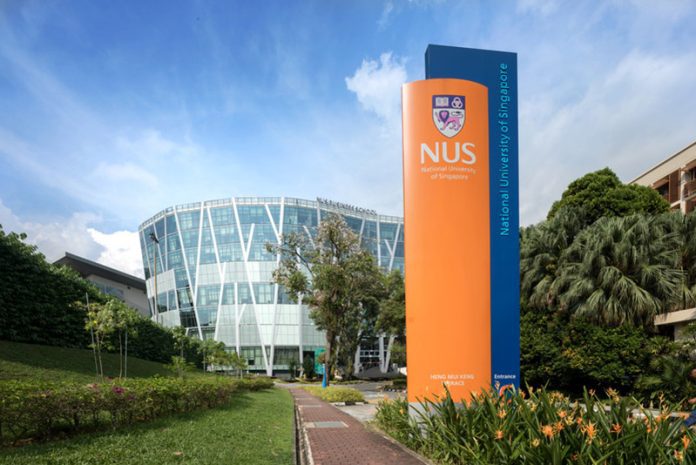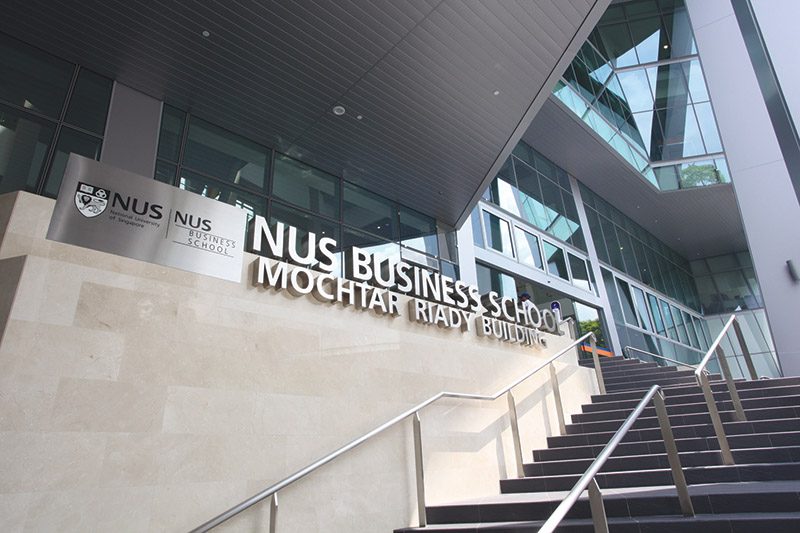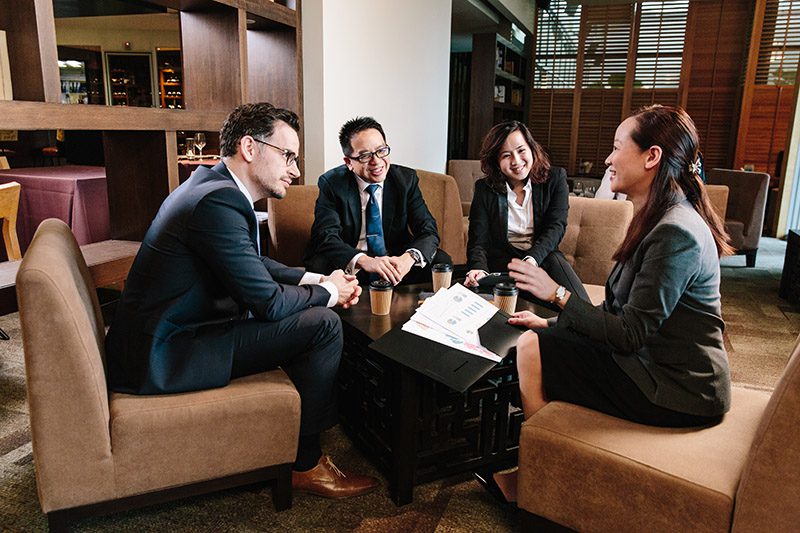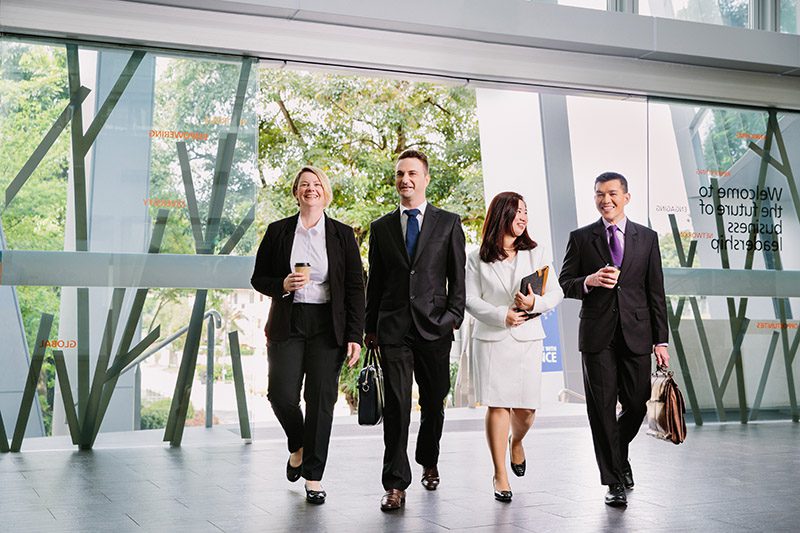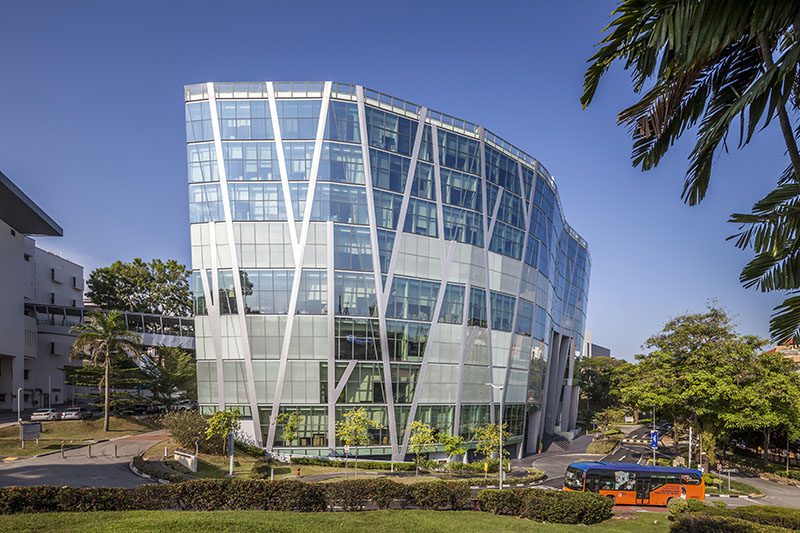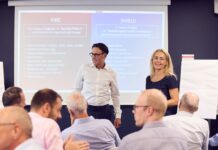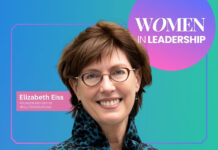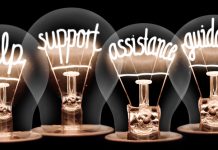A tough future in which the only constant is change awaits those who aspire to leadership in the world of business. To prepare these leaders in the making requires a special kind of training. Dr Prem Shamdasani of NUS Business School believes that the institution’s Executive MBA provides students with just such an education, and here he tells us why.
Good day, Mr Shamdasani! Thank you for taking time out of your busy schedule to speak with us. Perhaps we can start with you sharing a few words to give us a sense of NUS Business School as an institution, as the banner behind you describes it as “APAC’s most established Executive MBA”.
For over 50 years, I’m proud to say that NUS Business School has a proven track record of successfully developing leaders and has consistently offered rigorous, relevant, and rewarding business education to outstanding participants across the globe.
Our NUS Executive MBA is distinctive for offering the best global business knowledge with deep Asian insights, preparing participants to lead Asian businesses to international success and helping global businesses succeed in Asia. We happen to be celebrating our 25th anniversary this year, a milestone event we’re incredibly proud of.
The NUS Business School and NUS EMBA experience is ranked among the best in Asia and Asia Pacific. What makes the programme truly special?
This is the Asian century, and about 60 percent of global GDP will come from the Asia-Pacific. I genuinely believe that, as a programme, we have consistently delivered on our brand promise of a rigorous global EMBA programme, and our Asian focus within a global framework is how we can differentiate our programme from other MBA programmes. With a strong focus on providing thought leadership, frameworks and tools, business insights, and experiential and immersive learning experiences in Asia-Pacific, participants can expect a rich array of content, including case studies, guest speakers, and company visits to key destinations around the region.
Having spent more than 50 per cent of their time outside of Singapore, participants will leave with the proper knowledge, competencies, and networks to lead both global and Asian organisations to compete effectively in Asia and globally. So, whether you see your future as a professional or an entrepreneur, if it’s in Asia, this is an excellent programme for you.
Participants of the NUS EMBA programme come from a diverse range of backgrounds, from across the region. Can you tell us more about the diversity you see in the classroom, and how this enriches the learning experience?
With each cohort, we would like to see diversity in all aspects. We look at cultural, professional, and geographical diversity. We also look at the experience profile of the executives and how they will be able to contribute to the class. Because we often encourage peer learning and peer sharing, I find that leveraging almost 800 years of experience per cohort and having a diverse, experienced class adds richness to the conversations and overall learning experience for the participants. This approach allows them to enhance their ability to successfully lead people, teams, and organisations with the myriad perspectives of business and culture they have gained from fellow participants.
The NUS Executive MBA is the only programme that comprises immersive learning experiences across seven APAC countries. What do you mean by “immersive”?
When we designed this programme, we thought to ourselves that one cannot learn about doing business, for example, in Vietnam, from books and a remote classroom in Singapore. We wanted to create an immersive learning environment. The NUS Executive MBA takes our participants on this immersive learning experience, through what we call residential segments, to eight cities in seven countries, and in doing so we’re able to provide participants with deep exposure across Asia-Pacific.
These residential segments help equip participants with first-hand perspectives into the varied cultural, business, and political landscapes across Asia-Pacific. They typically attend lectures and presentations, participate in lively discussions and debates, visit local and international companies, and meet with business and thought leaders. Spending time in these destinations complements and provides local context, relevance, and a feel for the nuances of doing business in these respective countries, giving participants a deeper understanding of the business operations and best practices within that market. We find that this enhances the overall learning experience, allowing them to deepen their appreciation of the specificities and complexities of doing business in each country.
And I’ve personally noticed that networking and bonding happen much more extensively. When students are out in different destinations, learning, networking together and even partying together, it helps to create that sense of camaraderie and to build close bonds and friendships that last for a long time.
You talk about discovery and opening the students’ eyes, whether it’s to different cultures or ways of doing business. Alongside those “hard skills”, the technical skills embedded in that core curriculum, how does the NUS Executive MBA journey teach the soft skills of leadership that will then serve them well in the next steps of their career?
There are various ways that participants can develop their leadership skills on the EMBA: project work, group discussions, and peer-to-peer learning, for example, can provide opportunities for participants to learn how to work with individuals from different cultures, backgrounds, expertise, and experiences. Company visits and dialogue sessions with industry leaders can also provide participants with a deeper understanding on the types of leadership skills required of business leaders today across a variety of functions and industries.
You have also taught for many years, with your present role as Executive MBA Academic Director. Since you have encountered many students, what is your opinion of today’s EMBA students? How has the educational process and motivation changed over the years?
Global business perspectives and processes have changed drastically over the last few years. Thanks to the significant disruptions the world has experienced, the senior executives who take our programme are more resilient than ever. With every passing cohort, I see more and more individuals with the hunger for knowledge that falls far beyond their industries. They seem to be more open to alternative concepts, perspectives, and ideas that will help their companies and organisations be future-ready. Paired with the skills acquired through our programme, their open-mindedness and that willingness to pivot will help them become even better, influential leaders. Seeing our graduates soar in their professional careers and other new businesses is hugely gratifying.
What leadership attributes and skills do you see as being the most needed in a post-pandemic world? How does the NUS EMBA equip them?
The future is going to be a lot tougher. Navigating the VUCAH world and managing increasing risks of disruption brought about by technology, climate, supply chains, geopolitics, cyber, and talent requires today’s leaders to lead with purpose, strategic vision, agility, and speed. Joining the NUS EMBA enables leaders to transform and reinvent themselves and their organisations for long-term growth and sustainability.
Aside from moving on in their careers and growing and pivoting their businesses for success, I am always very gratified and proud to see our alumni give back to the programme and the school in terms of sharing experiences, guest speaking, and providing internships and scholarships.
How do you think the programme will continue to evolve in the next five years to adapt and respond to what both students and the market are looking for?
Since welcoming our first participants in 1997, this programme has grown from strength to strength, providing unrivalled exposure and immersion in the emerging and powerhouse economies across the Asia Pacific region. The world is constantly changing. Therefore, we must keep our finger on the pulse and move with significant shifts and trends happening in APAC. The University does a great job of keeping up with new business trends and knowledge. It shows how business needs are constantly evolving and how important it is to keep oneself up to date continually.
We will make tweaks to the programme when the situation calls for it. Throughout the years, for instance, we’ve expanded our geographical footprint. We used to visit one city in China only. But, given China’s importance to the region and the global economy, participants will now spend two weeks in both Shenzhen and Shanghai.
However, our commitment to providing that Asian context and focus through networking and immersive learning has remained consistent and true to our proposition. Even if you were a graduate 25 years ago, you would remember your experiences travelling, learning, and networking in key destinations in Asia where we take our students.
Executive Profile

Dr Prem Shamdasani is Associate Professor of Marketing; Academic Director, NUS Executive MBA Program; Co-Director, Stanford-NUS International Management Program; Director, and the NUS Marketing Strategy In A Digital World Program at the NUS Business School, National University of Singapore.
He holds a BBA degree with first class honours from the National University of Singapore (1984) and received his PhD in Marketing from the University of Southern California, Los Angeles (1990). His research and teaching interests include marketing strategy, brand management, customer-centricity and relationship management.
Aside from teaching graduate and executive MBA courses, Dr Shamdasani is active in consulting, executive development, and training and has worked with over 120 companies globally, such as Abbot, Gucci, McDonalds, Samsung, Microsoft, 3M, Philips, Bayer Healthcare, GSK, Barclays, Ernst & Young, Deloitte, Nestle, Volvo and Ikea.
He has co-authored two books, including one of the leading books on focus group research, Focus Groups: Theory and Practice, for Sage Publications (USA). His research publications have appeared in the leading regional and international journals and include the Journal of Consumer Research, European Journal of Marketing, Journal of Advertising Research, Journal of Advertising, Journal of Business Research, Asian Journal of Marketing, Asia Pacific Journal of Management, Asian Case Research Journal, Journal of Retailing and Consumer Services, and the Journal of Leadership Studies.


